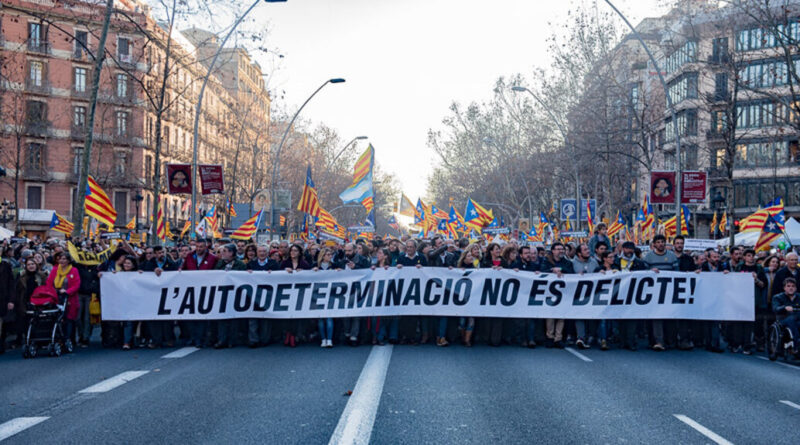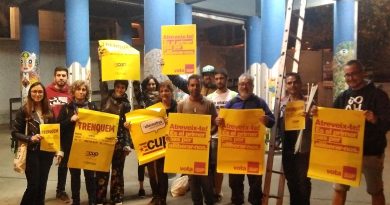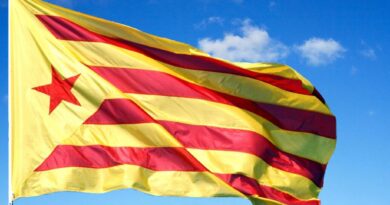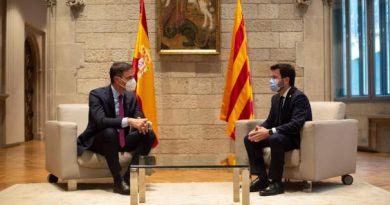The Amnesty and what is coming
The approval of the Law was possible due to popular mobilization sustained for years, not because of the benefits of the PSOE, nor the “cunning” of his partners. The right and the extreme right left the venue defeated, but they are entrenched to fight in the institutions. Questions arise about the scope of the norm. You cannot trust the bourgeois parties, whether Spanish or Catalan. It is necessary to build a new anti-capitalist alternative, radical left, for total amnesty, the breakup, self-determination and socialism.
The Amnesty law was approved in the Chamber of Deputies. The 177 votes of the majority that allowed the investiture of Pedro Sánchez surpassed the 172 votes gathered by the bloc led by the PP and followed by Vox. The socialist position was not defended by Pedro Sánchez but by Artemi Rallo Lombarte, a low-profile member of his parliamentary group.
Winners with varied opinions
In command of the winning block, The PSOE considered the amnesty and the result of the regional elections as part of the “institutional normalization, political and social in Catalonia”. The leaders of Junts per Catalunya focused on the “negotiating skill” of Carles Puigdemont and promised "rebuild" the political space that demands independence through peaceful means. For Gabriel Rufián, The credit goes to ERC for having initiated a stage of pacts and not to Puigdemont who “arrived late” to that path. The PNV, EHBildu and BNG also celebrated and agreed with the PSOE that it was “a historic day”
Losers and mire
For the PP it was the granting of“privileges and impunity” for the independentists. According to Santiago Abascal (Vox) ““They are going to forgive their partners just to stay in power.” (…) “approving a norm that legitimizes political violence in Spain”. UPN, he wondered if “It is really worth dividing the country for accepting the blackmail of secessionism”. The arguments of the right and the extreme right in the defeat expressed the most reactionary aspects of politics that consider the right to self-determination to be a crime.. They will try to overcome the bad news of the amnesty with good results in the elections to the European Parliament.
There is amnesty because there were mobilizations
The amnesty is neither due to the benefits of the PSOE nor to the “extraordinary” negotiating abilities of the independence leaders.. The freedom of the political prisoners first and the Amnesty later were possible because the Catalan people mobilized massively in the streets to achieve them., after the slogans of “Amnesty and self-determination”, with the addition added by the most combative sectors that the first was total. Even if it is an amnesty with limitations, It is an achievement that was reflected in legislation because it was forged in the streets.
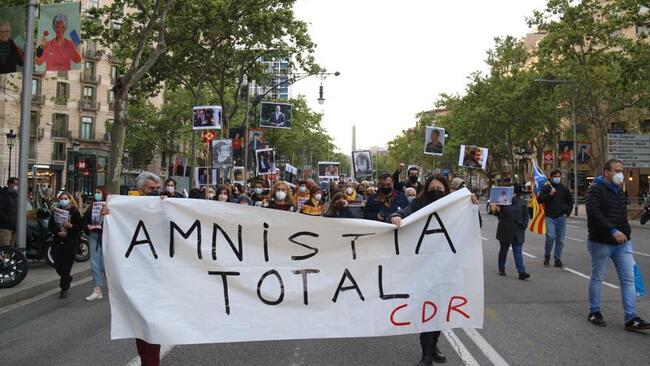
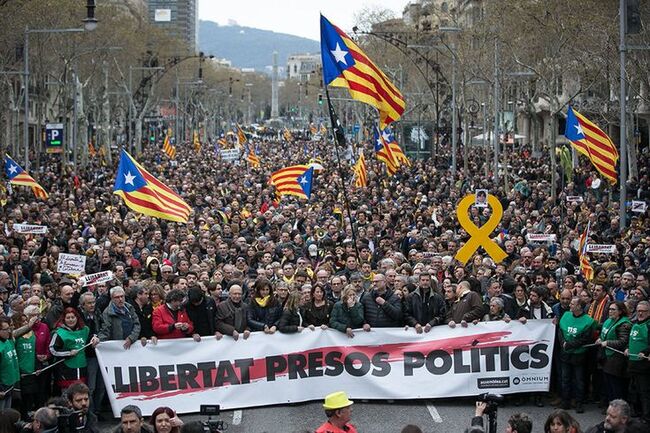
many questions
According to the approved text, The Amnesty Law aims “finalize the execution of sentences and judicial processes that affect all people, without exception, who participated in the independence process”. Nevertheless, The previous estimates refer to the possibility of favoring 350 imputed, when since 2011 there are thousands of activists prosecuted for: disobedience, attack on authority, embezzlement and terrorism, after sedition disappeared from the Penal Code. Many questions arise. Can the law be suspended?? Can Puigdemont return to Spain? What will happen to your arrest warrant?? Can Junqueras run again?? The institutional tangle of the '78 regime and the European Union leaves loopholes and the application of the norm will remain in the hands of many reactionary judges who will do everything possible to limit it., distort it and, if they could, suspend or repeal it. There is another topic, The law excludes from the amnesty acts that involve “a personal enrichment or financial benefit” of which there are several accused due to the process and some magistrates cling to this to justify their refusal to lower sentences. The 1-O prosecutors do not see that Puigdemont is eligible for amnesty due to the "embezzlement".
Uncertainty, polarization and crisis
The PSOE used the promise of amnesty to achieve the investiture of Sánchez and support the Legislature, negotiating with Junts, which in turn, He used it to surpass ERC and present himself as the best negotiator. With the law approved, The PSOE intends to completely close the stage of confrontation and return to the "normal", that is, within the '78 regime: with autonomy and without self-determination, with pacts and without mobilization. The leaders of Junts and ERC, although they maintain the independence discourse, are functional to these plans. Will Junst and ERC allow the investiture of Salvador Illa (PSC) how president from Government O there will be new elections autonomous? Will they try to recreate some kind of unity? Some of the top leaders have hinted that, although it is very difficult, rapprochement is a possibility. The attacks from the right and the extreme right will continue, both from their party headquarters and from the judicial offices, With which, polarization will continue to express itself and with it, uncertainty and crisis for working people. What is coming is a stage with uncertainties, crises and realignments in which, the fundamental, It will be the emergence of the mass movement to impose its own agenda of social and democratic needs..
We need a new radical left alternative
To face the right and far right that are making their way, trust cannot be placed in PSOE-PSC nor in his reformist partners from PODEMOS and Sumar who wash the face of Pedro Sánchez. And it is necessary to draw conclusions about the role of the leaders of Junts and ERC, who missed the historic opportunity to achieve the Republic with the people in the streets and feed the false expectation that independence can be achieved by convincing the oppressors to grant fundamental democratic rights, something that has proven impossible outside of the breakup. Junts increasingly blends in with its convergent right-wing and ERC past, and crisis, is already witnessing Junqueras' attempt to fully recover the reins of the party to deepen the autonomist and capitalist course.
Complete amnesty, self-determination and socialism
Regrettably, If the CUP does not change its course of adaptation to the institutionality and following the majority Catalan parties, will still not appear as an alternative. What is needed in Catalonia and in the Spanish State is a left front, a new anti-capitalist alternative, radical left, that supports the struggles of the workers and the people for: better salaries, decent working conditions, housing for all, public health and education, efficient and quality, among other social and democratic needs. That promotes mobilization and self-organization, with class independence and for a workers' government. Self-determination and socialism should not be conflicting objectives, nor separated by stages, but a unique and daily fight against the parties of the bourgeoisie and for the strategic exit from socialism.

